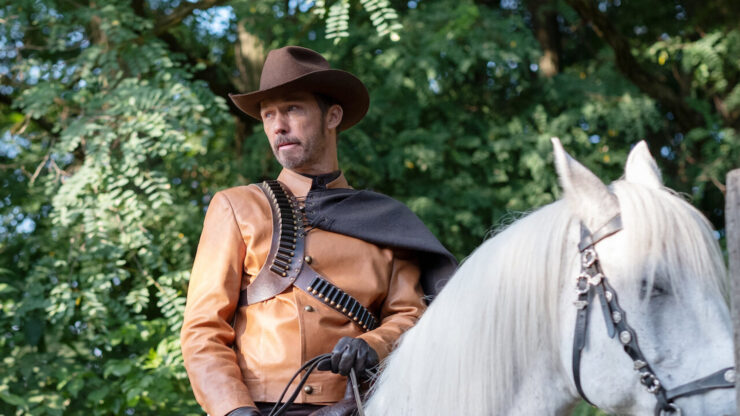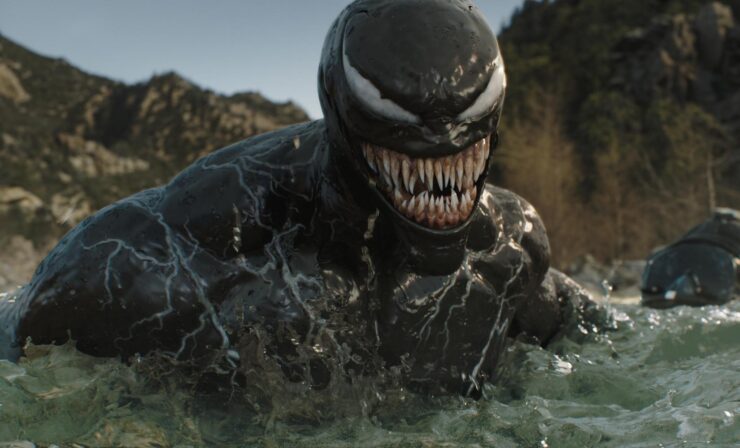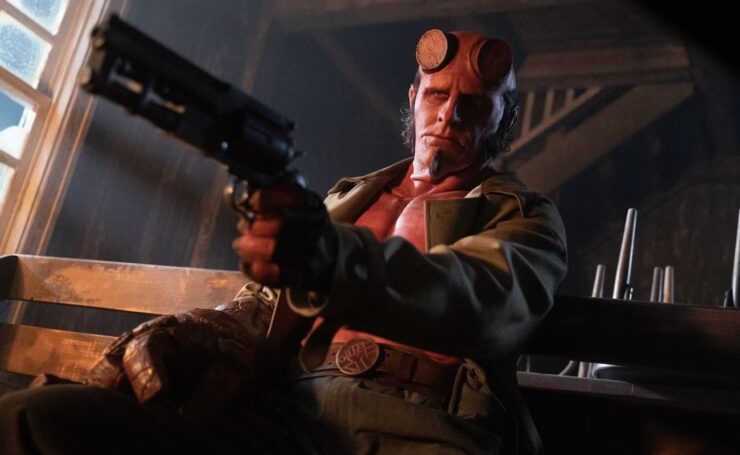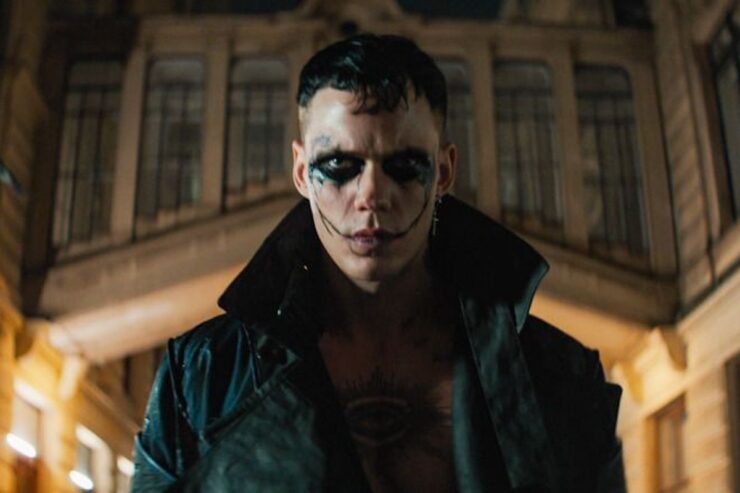From August 2017 – January 2020, Keith R.A. DeCandido took a weekly look at every live-action movie based on a superhero comic that had been made to date in the Superhero Movie Rewatch. He’s periodically revisited the feature to look back at new releases, as well as a few he missed the first time through. Today he’s covering the rather inexplicable sequel/prequel to R.I.P.D., R.I.P.D. 2: Rise of the Damned.
The 2013 adaptation of Peter Lenkov, Lucas Marangon, & Randy Emberlin’s 2001 comic book R.I.P.D. tanked like a big giant tanking thing, despite having an impressive cast (Jeff Bridges, Ryan Reynolds, Kevin Bacon, Mary Louise Parker). However, in 2011, while the movie was being filmed, Dark Horse Comics put out a second R.I.P.D. miniseries, Rise of the Damned by Jeremy Barlow & Tony Parker, that was an extended flashback to Roy Pulsipher’s first mission for the Rest In Peace Department in the nineteenth century.
For reasons passing understanding, a loose adaptation of that miniseries was released as a direct-to-home-video film in 2022.
Ironically, the 2011 comic book this film is based on redrew Pulsipher and his modern-day partner Nick to look like Bridges and Reynolds, respectively, and also altered the world-building to include elements of the movie, like the R.I.P.D. officers looking like other people when on Earth (which was not part of the original comic book).
But this adaptation, which was released eleven years later, didn’t include any of the cast members from the original film (from the looks of the production, they didn’t have the budget to afford any of them). Jeffrey Donovan replaces Bridges as Pulsipher, while Kerry Knuppe replaces Parker as the Proctor of the R.I.P.D. The rest of the cast includes Australian actor Penelope Mitchell putting on a comedy French accent as Jeanne d’Arc (replacing a male Puritan named Crispin Mather in the comic), Jake Choi as Slim, Richard Brake as Otis and the demon possessing him, and Rachel Adedeji and Evlyne Oyedokun as the avatars of Pulsipher and Jeanne, respectively.
The movie was released with very little fanfare on home video. Your humble rewatcher only found out about it by accident when his wife stumbled across it while looking for something to watch on Netflix.
“Message Royceph-ed!”
R.I.P.D. 2: Rise of the Damned
Written by Andrew Klein and Paul Leyden
Directed by Paul Leyden
Produced by Ogden Gavanski
Original release date: November 15, 2022
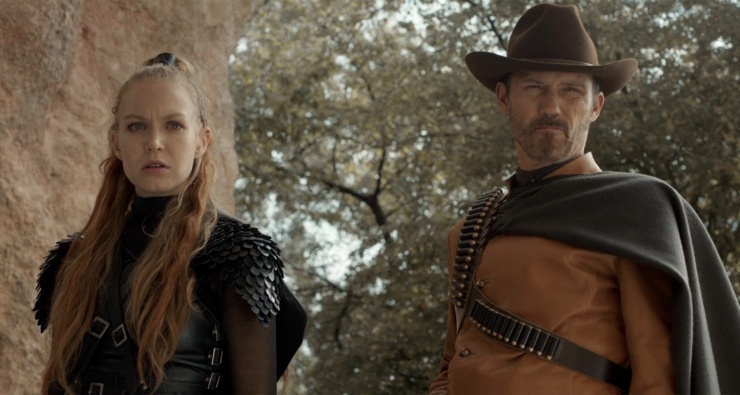
A man named Otis Clairborne is in a tapped-out gold mine in 1876, which he’s sure still has some gold in it. His pickaxe gets through the ground and exposes a portal to hell, which leads to Otis being possessed.
Marshal Roycephus Pulsipher is welcoming his daughter Charlotte home on a train, and less welcoming of her fiancé Angus. Pulsipher’s arguing with Charlotte over her taste in men is interrupted by the Samuels boys—who are on wanted posters all around the area—attacking the train. During the attack, Pulsipher shoots one of the Sameuls boys in the head, but is then shot and killed himself.
He winds up at the Rest In Peace Department, where he is deputized and signs a contract to become an enforcer for the R.I.P.D. to send deados back to hell. He is partnered with a French swordswoman who is very obviously Jeanne d’Arc (a.k.a. Joan of Arc). Both Pulsipher and Jeanne declare that they don’t want a partner—Jeanne specifically says she doesn’t need a fourth, as she already has the Father, Son, and Holy Ghost as eternal companions.
People are being kidnapped, and one of the victims is Angus. While Pulsipher doesn’t think much of Angus, he does make Charlotte happy, so he wants to rescue him. Jeanne, however, wants to stick to the mission and find out what’s happening in the mine. Pulsipher is also confused by the fact that their intelligence is that three of the four Samuels brothers were captured, because there should only be three Samuels boys left after Pulsipher shot one in the head.
Pulsipher is also nonplussed to learn that people on Earth see him and Jeanne as two Black women, and also that if he tries to speak to a loved one, all they’ll hear is gibberish. (This is tested when Pulsipher’s childhood friend arrives at his grave.)
Against Jeanne’s urging, Pulsipher goes after the stage that’s bringing the three captured Samuels boys to court. Jeanne reluctantly goes along, and they’re both shocked to see the one that Pulsipher shot in the head still alive and kicking. And the brothers have the ouroborous brand on their chest that indicates that they’re deados.
They send two of the Samuels boys back to hell, but the adopted brother, Slim, who is Asian, is kept alive for questioning. He says he doesn’t know what they’re doing up in the mine, but they’re all kidnapping people for some guy named Otis who wants bodies for more deados to possess. Otis also apparently has a gun like the one the R.I.P.D. officers are issued, which shocks Jeanne, as those things don’t generally get out.
Dragging Slim along behind them, Pulsipher and Jeanne ride to the town near the mine only to find it nearly deserted. En route, Slim is spectacularly annoying, and Pulsipher shoots him with his regular gun (which has no permanent effect on deados, but it does hurt). However, he does it so much that Slim gets used to it, and it loses its efficacy, so he just keeps being spectacularly annoying.
They get a room at a hotel, somehow convincing the manager to rent to them despite the “NO COLOREDS ALLOWED” sign, which Pulsipher rips down and demands that the manger burn—to which he acquiesces for no reason that the script bothers to provide.
The hotel’s maid talks about how people keep disappearing, and also there’s some weird gas or something coming from the mine. Pulsipher and Jeanne are ambushed by the remaining Samuels boys and are brought to the mine. They’re put in a cell with Angus, who is wearing a mask, as are most of the people who’ve been kidnapped, who are digging to make the hole Otis made at the top of the film bigger.
Buy the Book


Your Shadow Half Remains
Otis has an R.I.P.D. officer working for him, which explains where he got the gun. She reveals that Jeanne is Joan of Arc, which is presented as if it’s supposed to be some sort of surprise revelation. At one point, Pulsipher tries to query Angus about what he thinks of his fiancée’s now-deceased father, and for some reason, Angus tells this Black woman he’s never met about how much he respects Pulsipher.
Slim—who has been insisting all along that he’s not as bad as other deados, and he’s only been going along with his adoptive brothers because he didn’t have a choice—springs Jeanne and Pulsipher.
Jeanne has a small vial that contains the tears of Christ, which is the only thing that can seal the hole Otis is digging and send the souls back to hell. But it’s awash in hellfire, and Jeanne has a deep aversion to fire, as she still remembers every moment of being burned at the stake. So she gives Pulsipher the vial. Pulsipher inexplicably decides that Jeanne getting over her fear of fire is more important than saving the world, and leaves the vial with her and then goes to face Otis on his own.
The portal to hell opens up for realsies. The human victims all keep their eyes shut, as deados can only possess you if you’re looking at them. Somehow, they run out of the mine with their eyes shut without once tripping over anything or bumping into anything.
Pulsipher gets his ass kicked by Otis, who is not affected by R.I.P.D. weaponry like the other deados. Jeanne gets over her fear and dumps most of the tears of Christ into the fire, which closes the portal and sucks away all the deados. But Otis remains. It turns out that he’s not just any demon or lost soul, he’s Astaroth, Satan’s right hand. He beats the crap out of both Pulsipher and Jeanne, but Pulsipher hits on the idea of replacing the holy water in the rounds shot by his R.I.P.D. gun with the remaining tears of Christ. That sends Astaroth back to hell.
There’s a final bit of business with the mayor of the town, who apparently is the one who really killed Pulsipher, and then framed Slim for it. Then they attend the wedding between Charlotte and Angus, and once it’s done, all Pulsipher’s words are gibberish to Angus as well as Charlotte, because his soul now views Angus as a loved one.
Pulsipher talks about how he’s done with this whole being an R.I.P.D. officer thing, at which point Jeanne tells him he should’ve read the contract he signed, as he’s committed to R.I.P.D. for a hundred years.
“If I start quoting the Bible, Butterfield will die of old age”
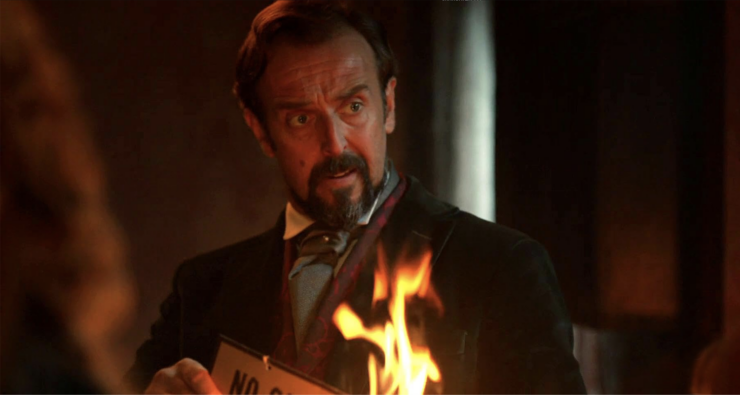
There are movies out there that are entertaining even if they’re terrible, kind of a so-bad-it’s-good thing. Or maybe it’s such a train wreck that it’s fun to pick apart the ludicrousness.
We’re not so lucky with this totally inexplicable sequel that is somehow worse than 2013’s R.I.P.D. It feels like it was written by someone whose entire knowledge of Westerns comes from seeing stills from Sergio Leone films and having watched Silverado as a kid, but not really remembering it all that well. (The climax also feels like it was written by someone who thought it would be cool to combine the climaxes of Raiders of the Lost Ark and Indiana Jones and the Last Crusade.) It feels like it was directed by someone who never got the memo that people can move while they’re being filmed, as this is one of the most un-kinetic movies I’ve ever seen. And apparently it had a budget that would make Roger Corman say, “Hey maybe we could spend a few more bucks.”
Jeffrey Donovan is a good actor, mostly, but watching him here is painful, as he only occasionally remembers that he’s playing a character who’s supposed to age into Jeff Bridges (though dead people don’t age, but whatever). Richard Brake has a fantastic voice, but it’s doing all the work, as he has no real presence to go with it. (He also is responsible for one of the more unintentionally funny things in the film, as at one point he’s chuckling mildly, and the captioning reads “[maniacal laughter].” Brake doesn’t have “maniacal laughter” in his toolbox, alas.)
The movie tries to sell us a good-parts version of the Old West. The only sop to racism is Pulsipher once saying that it might be difficult for them to get information when they’re disguised as Black women and the hotel that doesn’t allow Black people (and in 1876, that sign wouldn’t have had as nice a word as “coloreds” on it). Also nobody smokes or drinks. I mean, okay, stark realism isn’t something you expect from a movie about dead souls escaping hell to possess the living, but still…
Worse is that it takes what was actually an entertaining (if underwritten) comic book and removes just about everything interesting in it. The only improvement is replacing the Puritan Crispin Mather with the devout Jeanne d’Arc, but not nearly enough is done with that, either. (Also Jeanne wouldn’t have had long hair.) But the comic book it adapts had the big-ass demon (called Lucifage rather than Astaroth) actually not be the real bad guy—instead it was a dead soul who had his sights set on killing God. And there was a nice twist at the end which would’ve been a much cooler ending than a weak-kneed bit of closure for Pulsipher with the person who killed him and a boring wedding between Pulsipher’s charisma-free daughter and the nonentity she loves.
Next week, we dive into 2023 with the launch of the Marvel Cinematic Universe’s Phase 5: Ant-Man & The Wasp: Quantumania.
Keith R.A. DeCandido has a Weird Western story coming out in December: “The Legend of Long-Ears,” a team-up between Bass Reeves and Calamity Jane that will be in The Good, the Bad, and the Uncanny: Tales of a Very Weird West, edited by Jonathan Maberry, which can be ordered from Outland Entertainment.










